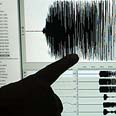
Magnitude 5.3 earthquake hits Israel
Strongest earthquake to rock country in a decade felt from Nahariya in the north down to Beersheba; epicenter near Tyre, Lebanon. It is impossible to predict when strong earthquake will take place, says expert
Reports of shaking were received from Nahariya in the north down to Beersheba. Magen David Adom emergency services said there were no reports of injuries, but several people suffered from shock.
The quake's epicenter was located 15 kilometers (10 miles) northeast of the Lebanese town of Tyre, or 70 km (45 miles) northeast of Haifa.
"It was really cool. The quake was pretty strong," Shahaf Cohen of Haifa told Ynet. "Everything in our house shook; so did the house itself. A few aftershocks followed the initial quake. It lasted for about 20 seconds."
Shai Hadad of Petah Tikva was working at his computer when the quake hit. "The chair and bed moved from side to side. The felt another weaker quake," he said.
The quake was the strongest to hit Israel in a decade.
The earthquake also shook Beirut, other parts of Lebanon and the Syrian capital of Damascus.
Residents in some areas of Beirut left their apartments and went into the street after the first jolt shortly after midday, which lasted a few seconds. A Lebanese man and two Palestinians were injured in Tyre when a balcony fell on top of them, the Lebanese National News Agency reported.
Residents of Damascus, the Syrian capital about a 2-hour drive away, reported feeling the quake as well. There was no word on the magnitude, but it appeared to be a small quake.
On Monday night, a mild earthquake measuring 4.0 on the Richter Scale was felt across Israel, from Kiryat Shmona in the north to the Jerusalem area. Police and emergency centers in the north were flooded with phone calls from concerned citizens wishing to report the quake.
'Almost nothing being done in Israel'
Despite the recent quakes, experts explain that this does not indicate that a stronger earthquake is expected any time soon.
"This does not testify to an increase or a slowdown. In any case, we must take note of the situation, regardless of what happened," Dr. Dr. Ephraim Laor, who headed the steering committee appointed to prepare for earthquakes, told Ynet on Friday.
Thousands of earthquakes and seismic activities are felt across the world every year, some of them affecting nearby areas. One of them was Friday's quake, whose epicenter was located in southern Lebanon.
Despite the fact that earthquakes have claimed the lives of hundreds of thousands of people over the past century, it is still impossible to predict when a strong quake will take place.
Dr. Laor presented as an example the earthquake which took place in Iran in 2003, leaving more than 40,000 people dead.
"The quake was in a place where there had not been one movement in more than 2,000 years," he said.
And what is Israel doing in order to prepare for such a quake. According to Dr. Laor, almost nothing.
"Work has been done, but it was almost stopped completely following the Second Lebanon War. It has hardly been resumed, and I hope now it will be resumed," he added.
Dr. Laor noted that apart from reinforcing buildings, Israel must keep in touch with its neighboring countries and international organizations, as a disaster in the country is expected to claim the lives of some 16,000 people.
The Geophysical Institute of Israel reported that several areas in Israel were prone to earthquakes, including the Great Rift Valley which stretches along the Jordanian border.
"There are seismogenic areas in Israel where the likelihood for an earthquake is much greater than in other areas across the country. In general, the area which generates earthquakes is the Dead Sea Rift, but there are also other areas which suffer from quakes from time to time, like the southern Lebanon area," explained Dr. Uri Frieslander, the institute's director-general.
Dr. Frieslander believes that Friday's quake had nothing to do with the 7.3-magnitude quake which took place in Greece on Thursday.
Tal Rabinovsky, Hagai Einav and AP contributed to the report










